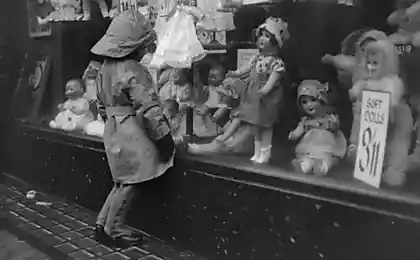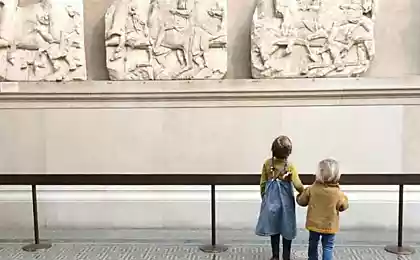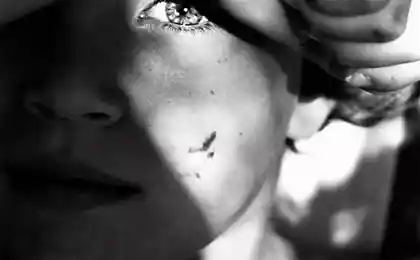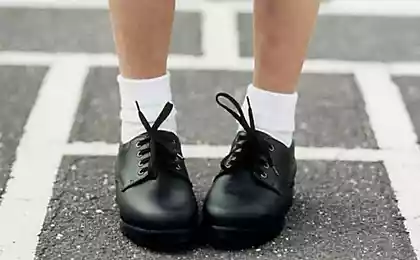491
What to do if the baby is lying
Many parents are faced with the fact that the child is telling the truth – lying and cheating.
As a rule, the reaction of parents to this behavior is to scold, shame, punish the child.
But as soon as you begin to understand why your child is lying and cheating, then you will be able to help him change his behavior and become more honest. The key word here is "help". Not force, not force, that is to help the child not to lie and to deceive, and to tell you the truth.

If we begin to understand why the child is lying and cheating, we will see that he just still afraid of punishment, yelling and the fact that he will be scolded. It turns out a vicious circle. The more we criticize the child for cheating, the more he will hide the truth from us in the future. Some way out of this?
In children, usually detected fairly logical reason to hide the truth – they want to avoid unpleasant consequences to themselves, do not want to disappoint your parents, listen to the cries and sentries sermons.
The child hard not to lie when he knows exactly what he's looking for the truth, a very unpleasant outcome. So, knowing all of these reasons, we need to create such conditions in the family that the child could easily tell us everything as it is.
There are cases when the child wants to embellish the situation, to produce other great impression to acquire more weight in the eyes of others. This happens when the child feels that he is not good enough as what he is. And instead of blame him, it must be understood and to assure that he was all right, and he did not necessarily think about something that is actually there.
And maybe so that the child does not cheat on purpose and I understood or remembered the situation differently and recounts her exactly as perceived. In this case, would be completely unfair to talk about cheating. Just a kid remember.
For some children, fantasy is a psychological protection, which helps to cope with some difficult circumstances in their lives. For example, the child's dog died. He doesn't want to believe it and fantasizes that the dog actually ran away and lives in the forest. In this case, he starts to believe in this fantasy that tells others about it. Can we say in this case that the child is cheating? No. He uses fantasy to protect themselves from painful experiences, which was not ready. In his subjective inner world, the dog, indeed, live in the woods. And he believes it.
Repeat: when we punish kids for lying, they continue to deceive, hoping to avoid any punishment in the future. The following nine tips will help you make your relationship with your child more confidence. They will help you establish such a climate in the family in which children will be easy to tell the truth.
Just please, please be patient and understand that the situation could change quickly. It takes time to between you again, increased confidence. Be patient and consistent.
Try not to frighten the child with their emotional reactions to his actions, hurtful words, shouting, threats and punishments. Such reactions do not teach children for the future, not teach them something new. They just help you to "let off steam" but instill fear in your child.So be careful how you react to "bad" behavior kids. For example, spilled juice on the carpet, spilled salt, unmade toys, unwashed hands, undone lessons. If the child knows that the reaction of the mom or dad on his transgressions is excessively violent, emotional, angry, mom will cry, and dad grabbed for the strap, it can be difficult to tell you the truth.
Do not focus on blaming the child for what has happened and on the search with him out of the current situation. Ask your child: "What can we do now to eliminate the consequences?" Instead of being angry and blaming, think together, what can be done now.
Example: Mom is angry at 5-year-old daughter because she dropped his hands and broke a beautiful dish. Instead of yelling at her and to punish my mother coped with his emotions and said, "let's think, what can you do now?" The girl herself was very nervous and apologized, mom offered to try to glue the broken dish. They glued the dish and the mother explained that now they can not be used and it will stand simply for beauty. Mom also said that very upset about the incident, but realizes that the girl didn't and this could happen to anyone. She showed her daughter how the next time you need to keep a large dish in her hands so she didn't.
If you see a pile of stuff on the floor in your daughter's room, do not ask: "did You get your stuff off the floor?" When we ask questions we already know the answer, we are encouraging your child to ensure that he lied in the hope that you will be left behind. Instead, emphasize that in your question solutions to this situation, for example: "I see that there is still lying on the floor a lot of your stuff, you help them to clean or do it myself?" or "do You want to remove your clothes now or when you finish eating dinner?"If you know that your son didn't take the lessons, instead of asking "have You done your homework?", ask: "What are your plans for the lessons? What do you think?"
Instead of asking the daughter: "you trodden in the hallway?", ask "How are we going to clean up the floor in the hallway? And how do you think I need to do to in the hallway from street shoes no longer had dirt on the floor?"
Such questions allow your child to engage in active discussion, to "save face," prevent him "power struggle" and you help him to focus on the action plan that we need to do, instead of making excuse or come up with something. Also, it's perfectly teaches the child for the future.
Instead of "caught" the child for his deception and came down on him with accusations: "Why are you lying to me? I raised a liar! Tell me the truth!" – try to look in the root of the problem and understand why your child can not now tell you the truth in this situation. Say: "what you say sounds very plausible. I think you just can't seem to tell me how it really is. Maybe you're afraid of something? Let's talk about it together and discuss the situation. It is always better to tell the truth as it is."Say non-threatening, and engaging tone. Reassure the child that you will not scold or punish him for the truth, whatever it was. In the future, the child will remember this experience and more to share with you because it will know – you are safe to share what happened.
Believe me, the punishment and abuse makes no sense! I do not help your swearing and punishing the child in the future behave differently or to tell you the truth. But the discussion and trusting conversation with him will help. If not immediately, but such talks will bear fruit.
"Mommy, don't be rude, I got there something happened"... "Mommy, I got something to say, only you don't scold me, please" ... first and foremost, you need to pay attention: despite the fact that the child understands that he did something wrong, he still came to you and admitted what happened. And even if you are upset that on the bathroom floor a sea of water, because your daughter tried to bathe in the sink a doll, you need to praise her for what she came to you and she told me all about that filled the entire floor.
Say, "I really appreciate you telling me the truth as it is, telling the truth. Most importantly, and now we're going to wipe".
It often happens that the child first tells a lie, and then corrected and recognized. And often the parents, instead of to praise the child for their courage to tell the truth and its recognition continue to blame him for that at first, he still cheated. He straightened, took a step in the right direction, but the focus parents make still that at first he told a lie.
The child receives a lesson – "no Matter, I deceive or tell the truth – I in both cases, abuse. Confess or not confess – better not be". To such conclusions the child did, and knew that his confession will be of great benefit and will lead to a constructive discussion, it is necessary to note the sincerity of the child, to praise his honesty.
Every mistake is an opportunity to learn something new, get new experience. The child needs to explain that making mistakes is fine we all make mistakes and learn from the mistakes, everything can be redone and corrected. Not mistaken only one who does nothing. Help your child see mistakes as an opportunity to learn something. To do this, ask him: "If you were to do it again, what would you do differently? Come to think of it as the next time it is better to do in this situation?". Plan with your child, share your ideas and help your son or daughter to an important conclusion.
When we, as adults, calmly take the child's mistakes and teach him the proper attitude towards them, it will be easier to tell the truth and admit mistakes and failures in the future.
Say you love the baby just like that, no matter what, even if he is trouble and he's wrong. Make sure your child knows: despite his transgressions, errors or bad behavior, you will never love him less. This helps the child to feel safe and more open to you.
Remember that our children learn from us. Sometimes we do lie to our kids in detail, and we believe that it is "nothing wrong", "lies". For example, tell the child, "If you'll gather and we'll quickly go out, I'll buy you ice cream". And then it turns out that we didn't take the money, or just don't have time to go to the store, or we changed our mind, because "soon it's dinner time", etc. Another example: we don't want to come in the evening guests, so tell them on the phone, not us that we are leaving, and the child knows that actually we're not leaving. Another example of a small household lies of adults. And such examples can cause a lot. So be careful to always tell the truth in the presence of a child (and not only), and keep his word.
Even if you caught a child cheating, don't ever call him such insulting words. They did not have any pedagogical meaning, but only further complicate the situation. The child eventually reconciles with these labels and is beginning to feel precisely what you call it.
Especially don't do it in the presence of a child. It is very humiliating and insulting and will greatly complicate your relationship with him. Don't take out the garbage in public. Try to solve these problems within the family and help the child to save face in front of other adults and his friends. It will help him soon to change.If you feel that you followed all these recommendations and your child still continues to lie and deceive, you may need the help of a professional child psychologist.
In this article you learned 9 recommendations on how to create a home environment where the child will feel safe and it will be difficult to tell you the truth. You also learned about how to talk with your child if you understand what he is telling you the truth. published
P. S. And remember, just changing your mind — together we change the world! ©
Join us in Facebook , Vkontakte, Odnoklassniki
Source: ipsyholog.ru/rebyonok-vret-i-obmanyvaet-chto-delat/
As a rule, the reaction of parents to this behavior is to scold, shame, punish the child.
But as soon as you begin to understand why your child is lying and cheating, then you will be able to help him change his behavior and become more honest. The key word here is "help". Not force, not force, that is to help the child not to lie and to deceive, and to tell you the truth.

If we begin to understand why the child is lying and cheating, we will see that he just still afraid of punishment, yelling and the fact that he will be scolded. It turns out a vicious circle. The more we criticize the child for cheating, the more he will hide the truth from us in the future. Some way out of this?
In children, usually detected fairly logical reason to hide the truth – they want to avoid unpleasant consequences to themselves, do not want to disappoint your parents, listen to the cries and sentries sermons.
The child hard not to lie when he knows exactly what he's looking for the truth, a very unpleasant outcome. So, knowing all of these reasons, we need to create such conditions in the family that the child could easily tell us everything as it is.
There are cases when the child wants to embellish the situation, to produce other great impression to acquire more weight in the eyes of others. This happens when the child feels that he is not good enough as what he is. And instead of blame him, it must be understood and to assure that he was all right, and he did not necessarily think about something that is actually there.
And maybe so that the child does not cheat on purpose and I understood or remembered the situation differently and recounts her exactly as perceived. In this case, would be completely unfair to talk about cheating. Just a kid remember.
For some children, fantasy is a psychological protection, which helps to cope with some difficult circumstances in their lives. For example, the child's dog died. He doesn't want to believe it and fantasizes that the dog actually ran away and lives in the forest. In this case, he starts to believe in this fantasy that tells others about it. Can we say in this case that the child is cheating? No. He uses fantasy to protect themselves from painful experiences, which was not ready. In his subjective inner world, the dog, indeed, live in the woods. And he believes it.
Repeat: when we punish kids for lying, they continue to deceive, hoping to avoid any punishment in the future. The following nine tips will help you make your relationship with your child more confidence. They will help you establish such a climate in the family in which children will be easy to tell the truth.
Just please, please be patient and understand that the situation could change quickly. It takes time to between you again, increased confidence. Be patient and consistent.
Try not to frighten the child with their emotional reactions to his actions, hurtful words, shouting, threats and punishments. Such reactions do not teach children for the future, not teach them something new. They just help you to "let off steam" but instill fear in your child.So be careful how you react to "bad" behavior kids. For example, spilled juice on the carpet, spilled salt, unmade toys, unwashed hands, undone lessons. If the child knows that the reaction of the mom or dad on his transgressions is excessively violent, emotional, angry, mom will cry, and dad grabbed for the strap, it can be difficult to tell you the truth.
Do not focus on blaming the child for what has happened and on the search with him out of the current situation. Ask your child: "What can we do now to eliminate the consequences?" Instead of being angry and blaming, think together, what can be done now.
Example: Mom is angry at 5-year-old daughter because she dropped his hands and broke a beautiful dish. Instead of yelling at her and to punish my mother coped with his emotions and said, "let's think, what can you do now?" The girl herself was very nervous and apologized, mom offered to try to glue the broken dish. They glued the dish and the mother explained that now they can not be used and it will stand simply for beauty. Mom also said that very upset about the incident, but realizes that the girl didn't and this could happen to anyone. She showed her daughter how the next time you need to keep a large dish in her hands so she didn't.
If you see a pile of stuff on the floor in your daughter's room, do not ask: "did You get your stuff off the floor?" When we ask questions we already know the answer, we are encouraging your child to ensure that he lied in the hope that you will be left behind. Instead, emphasize that in your question solutions to this situation, for example: "I see that there is still lying on the floor a lot of your stuff, you help them to clean or do it myself?" or "do You want to remove your clothes now or when you finish eating dinner?"If you know that your son didn't take the lessons, instead of asking "have You done your homework?", ask: "What are your plans for the lessons? What do you think?"
Instead of asking the daughter: "you trodden in the hallway?", ask "How are we going to clean up the floor in the hallway? And how do you think I need to do to in the hallway from street shoes no longer had dirt on the floor?"
Such questions allow your child to engage in active discussion, to "save face," prevent him "power struggle" and you help him to focus on the action plan that we need to do, instead of making excuse or come up with something. Also, it's perfectly teaches the child for the future.
Instead of "caught" the child for his deception and came down on him with accusations: "Why are you lying to me? I raised a liar! Tell me the truth!" – try to look in the root of the problem and understand why your child can not now tell you the truth in this situation. Say: "what you say sounds very plausible. I think you just can't seem to tell me how it really is. Maybe you're afraid of something? Let's talk about it together and discuss the situation. It is always better to tell the truth as it is."Say non-threatening, and engaging tone. Reassure the child that you will not scold or punish him for the truth, whatever it was. In the future, the child will remember this experience and more to share with you because it will know – you are safe to share what happened.
Believe me, the punishment and abuse makes no sense! I do not help your swearing and punishing the child in the future behave differently or to tell you the truth. But the discussion and trusting conversation with him will help. If not immediately, but such talks will bear fruit.
"Mommy, don't be rude, I got there something happened"... "Mommy, I got something to say, only you don't scold me, please" ... first and foremost, you need to pay attention: despite the fact that the child understands that he did something wrong, he still came to you and admitted what happened. And even if you are upset that on the bathroom floor a sea of water, because your daughter tried to bathe in the sink a doll, you need to praise her for what she came to you and she told me all about that filled the entire floor.
Say, "I really appreciate you telling me the truth as it is, telling the truth. Most importantly, and now we're going to wipe".
It often happens that the child first tells a lie, and then corrected and recognized. And often the parents, instead of to praise the child for their courage to tell the truth and its recognition continue to blame him for that at first, he still cheated. He straightened, took a step in the right direction, but the focus parents make still that at first he told a lie.
The child receives a lesson – "no Matter, I deceive or tell the truth – I in both cases, abuse. Confess or not confess – better not be". To such conclusions the child did, and knew that his confession will be of great benefit and will lead to a constructive discussion, it is necessary to note the sincerity of the child, to praise his honesty.
Every mistake is an opportunity to learn something new, get new experience. The child needs to explain that making mistakes is fine we all make mistakes and learn from the mistakes, everything can be redone and corrected. Not mistaken only one who does nothing. Help your child see mistakes as an opportunity to learn something. To do this, ask him: "If you were to do it again, what would you do differently? Come to think of it as the next time it is better to do in this situation?". Plan with your child, share your ideas and help your son or daughter to an important conclusion.
When we, as adults, calmly take the child's mistakes and teach him the proper attitude towards them, it will be easier to tell the truth and admit mistakes and failures in the future.
Say you love the baby just like that, no matter what, even if he is trouble and he's wrong. Make sure your child knows: despite his transgressions, errors or bad behavior, you will never love him less. This helps the child to feel safe and more open to you.
Remember that our children learn from us. Sometimes we do lie to our kids in detail, and we believe that it is "nothing wrong", "lies". For example, tell the child, "If you'll gather and we'll quickly go out, I'll buy you ice cream". And then it turns out that we didn't take the money, or just don't have time to go to the store, or we changed our mind, because "soon it's dinner time", etc. Another example: we don't want to come in the evening guests, so tell them on the phone, not us that we are leaving, and the child knows that actually we're not leaving. Another example of a small household lies of adults. And such examples can cause a lot. So be careful to always tell the truth in the presence of a child (and not only), and keep his word.
Even if you caught a child cheating, don't ever call him such insulting words. They did not have any pedagogical meaning, but only further complicate the situation. The child eventually reconciles with these labels and is beginning to feel precisely what you call it.
Especially don't do it in the presence of a child. It is very humiliating and insulting and will greatly complicate your relationship with him. Don't take out the garbage in public. Try to solve these problems within the family and help the child to save face in front of other adults and his friends. It will help him soon to change.If you feel that you followed all these recommendations and your child still continues to lie and deceive, you may need the help of a professional child psychologist.
In this article you learned 9 recommendations on how to create a home environment where the child will feel safe and it will be difficult to tell you the truth. You also learned about how to talk with your child if you understand what he is telling you the truth. published
P. S. And remember, just changing your mind — together we change the world! ©
Join us in Facebook , Vkontakte, Odnoklassniki
Source: ipsyholog.ru/rebyonok-vret-i-obmanyvaet-chto-delat/























